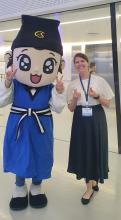Interview in October 2023

After studying Applied Natural Sciences, Dr Caroline Hommel began her doctorate at the Institute of Energy Process Engineering and Chemical Engineering in 2015, which she completed in March 2023. Since 2021, Caroline Hommel has been working as a research assistant at the Centre for Quantum Nanoscience in Seoul,
South Korea.
You studied in Freiberg. What made you decide to study at the Bergakademie?
I was interested in various technical and scientific degree programmes throughout Germany, such as shipbuilding, marine biology and biophysics. However, I would have had to specialise early on. The job centre then suggested the Applied Natural Sciences course to me. A course that teaches the basics of chemistry, biology, physics and maths. So I didn't have to decide on a subject straight away. In addition, the TU Bergakademie has a good reputation in terms of the supervisor-to-student ratio and the chance of good laboratory places.
What did you learn during your studies in Freiberg that is particularly helpful for your current (research) work? I often draw on my knowledge of analytical chemistry, as I am responsible for various analysers in my current job. But the basics of theoretical physics also come in handy while working at an institute for quantum physics.
What lasting memories do you associate with your time at TU Bergakademie Freiberg?
There are so many wonderful memories, such as organising countless events during committee work, like carnival evenings or demonstrations for more money in education, the ride in the anniversary balloon to celebrate 250 years of TUBAF, motto parties, ... the list is still very long. However, I am still particularly happy that I was able to make music with the Wood'n'Brass BigBand and am therefore part of this family.
When you look back on your studies with the knowledge you have today: is there anything you would do differently or what you would pay attention to?
All in all, I am very happy with how my studies went and would do it the same way again at any time. However, I would possibly try to get a job as a student assistant before I start my Master's programme so that I can network better with the various chairs and students from different years.
What advice would you like to give to current students in Freiberg?
Take the opportunity to gain some experience outside of lectures and seminars. Make friends, go to parties, enjoy life. You'll meet more like-minded people during your studies than anywhere else. Make your studies a special time for you.
What do you find particularly interesting about your current job?
Like my studies, my current work is also very interdisciplinary and I never get bored. I work at the interface between scientists and the public. Scientifically, I work in the newly established chemistry laboratory at the Centre for Quantum Nanoscience. There I synthesise and analyse new organic compounds with special physical properties that could be used in quantum computers or data storage devices in the future. With the help of so-called scanning tunnelling microscopes, it is possible to examine and image individual atoms and molecules. Being able to really see "my own" molecules and compare them with the typical chemical structural formulae is an absolute highlight.
In addition to laboratory work, I find particular variety in designing, creating and editing videos, images and posters for public relations work. I learn new techniques and backgrounds with every project, both scientifically and in terms of software. This gives me the opportunity to learn from my colleagues, to network better and to familiarise myself quickly with new topics.
Do you still have professional or private contacts with TU Bergakademie Freiberg today?
I have met many friends and colleagues at TU Bergakademie over the years with whom I like to keep in touch. It's always a matter of exchanging expertise, both scientifically and on design issues, or developing ideas and realising various projects.
Finally, tell us your life motto?
A lot of things are easier with a laugh.
My studies
- First lecture: 07:30 or 14:00? After 10 am
- Favourite meal in the canteen? Potato soup
- Freiberger beer or Saxon wine? Cold beer
- Uni dress code: Jacket or sweatshirt? T-shirt and jeans
My university
- My "quiet place": My lab at the IEC
- My "there-I've-never-been-place": Old Porzelline
- My "Good Soul": My best friend Elli
- My "no go": skipping university after parties
- My favourite lecturer: Dr Cameliu Himcinschi
- My hardest exam: AAOC (General, Inorganic and Organic Chemistry)